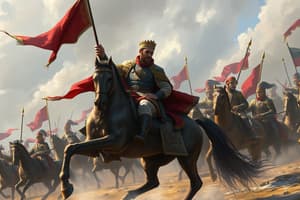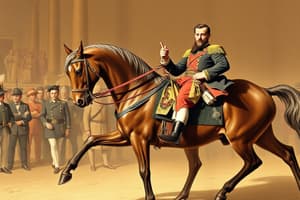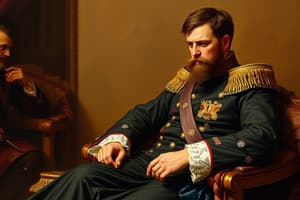Podcast
Questions and Answers
What particular reform is Alexander II most noted for during his reign?
What particular reform is Alexander II most noted for during his reign?
- Industrial modernization
- Emancipation of the serfs (correct)
- Military expansion
- Constitutional democracy
What was one major consequence of Russia's defeat in the Crimean War for Alexander II?
What was one major consequence of Russia's defeat in the Crimean War for Alexander II?
- It strengthened autocratic beliefs.
- It led to increased military funding.
- It prompted a need for modernization. (correct)
- It resulted in an immediate abdication.
What was one of the economic arguments against serfdom in Russia?
What was one of the economic arguments against serfdom in Russia?
- It hindered industrial and agricultural development. (correct)
- It promoted the free movement of labor.
- It was beneficial for agricultural growth.
- It supported enterprise expansion.
How did Alexander II's approach to autocracy differ from that of his father, Nicholas I?
How did Alexander II's approach to autocracy differ from that of his father, Nicholas I?
What was the primary challenge Alexander II faced regarding serfdom?
What was the primary challenge Alexander II faced regarding serfdom?
What was a major military objection to serfdom?
What was a major military objection to serfdom?
What led to the growth of radical political opposition during Alexander II's reign?
What led to the growth of radical political opposition during Alexander II's reign?
What contributed to a political climate favorable to reform during Alexander II's reign?
What contributed to a political climate favorable to reform during Alexander II's reign?
What was one of Alexander II's main aims with his reforms?
What was one of Alexander II's main aims with his reforms?
What did Nicholas I advise Alexander II to do before his death?
What did Nicholas I advise Alexander II to do before his death?
Which group was responsible for the assassination of Alexander II?
Which group was responsible for the assassination of Alexander II?
How did Alexander II encourage optimism regarding reform initially?
How did Alexander II encourage optimism regarding reform initially?
Which of the following issues was highlighted by the Crimean War's outcome?
Which of the following issues was highlighted by the Crimean War's outcome?
What was one of the factors leading to peasant unrest before reforms were implemented?
What was one of the factors leading to peasant unrest before reforms were implemented?
What was Alexander II's ultimate aim with his social and political reforms?
What was Alexander II's ultimate aim with his social and political reforms?
What challenge did Alexander II face as he tried to modernize Russia?
What challenge did Alexander II face as he tried to modernize Russia?
Flashcards are hidden until you start studying
Study Notes
Alexander II's Tsardom Perspective
- Alexander II ascended the throne in March 1855 at age 36, seen as well-prepared for leadership.
- Historian Lionel Kochan labeled him as "the best prepared heir the Russian throne ever had".
- Received guidance from his father Nicholas I, who urged him to maintain autocratic powers.
- Despite a commitment to autocracy, Alexander II was more open to liberal ideas and arguments from advisors.
Impact of the Crimean War
- The Crimean War (1854-1856) highlighted severe issues in Russia, notably in communications, military, and administration.
- Only 60,000 of 1 million summoned soldiers reached battle, revealing logistical failures.
- Russian forces lacked modern weaponry, leading to significant losses due to illness and disease.
- The humiliating defeat prompted Alexander II to recognize the urgent need for modernization to maintain Great Power status.
Reforming the Serfdom Institution
- The institution of serfdom was a major social and political challenge, facing both moral and economic criticism.
- Discussions on serfdom's elimination included moral objections and its role in hindering Russia's economic and military progress.
- Military issues arose due to long serf service, complicating necessary army reforms.
- Over 350 peasant revolts erupted between 1844 and 1854, escalating due to increased tensions during the Crimean War.
Political Climate for Reform
- The defeat in Crimea created a favorable environment for reforms under the new, younger tsar.
- Widespread belief among intellectuals, nobles, and administrators in the necessity for change characterized Alexander II's early reign.
- Alexander II fostered optimism by easing press censorship and promoting discussions on serfdom.
Aims of Social and Political Reforms
- Alexander II's primary goal was to enhance Russia's status as a great power post-Crimea through internal and external improvements.
- Sought peace and stability in rural areas, along with a prosperous peasantry, aiming for economic growth.
- Desired to navigate a middle path, implementing modernization while preserving support from conservative nobles.
- Acknowledged that reforms could create new problems, raising concerns about their overall efficacy in achieving desired outcomes.
Balanced Modernization Strategy
- Focused on social and economic modernization to strengthen the autocratic tsarist state without risking political changes that could empower civil society.
- Aimed to facilitate progress without compromising the established authority of the Romanov regime.
- Encapsulated the challenge of wanting to maintain autocratic governance while achieving modernization—"having his autocratic cake and eating it too."
Studying That Suits You
Use AI to generate personalized quizzes and flashcards to suit your learning preferences.




